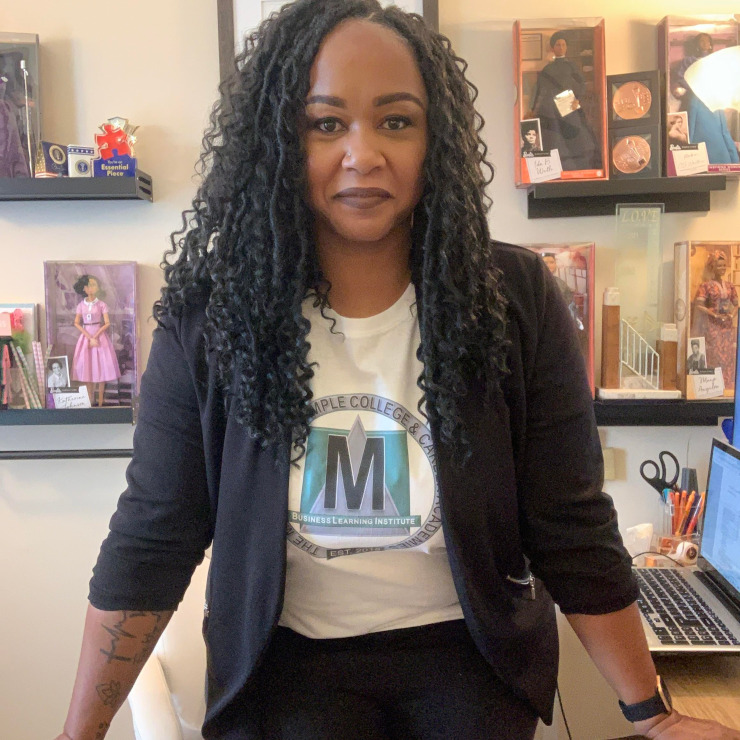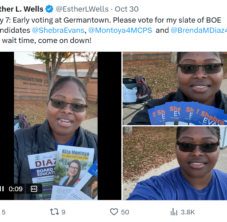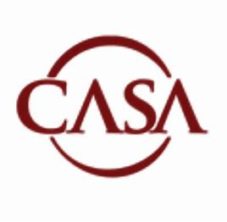The MECCA Business Learning Institute (MBLI) is a public charter school opening in Germantown, Fall 2025. The school’s founder (and president/CEO of the parent organization MBEF College & Career Academies, Inc.) LaChaundra Graham effuses the energy, passion, knowledge, and determination required to provide the county’s school children with a solid middle-school experience. She took a minute from her busy schedule to give us an interview.
How long have you been working on opening MBLI?
Our journey to open MBLI began in 2018/2019, when we actively participated in district-led technical sessions to fully understand how to submit a comprehensive and competitive charter school application. Our first application was submitted during the 2019/2020 cycle, but the COVID-19 pandemic caused significant delays, stalling progress across the board. Once we were able to resume efforts, we submitted a new application in 2021/2022. Despite the superintendent recommending approval, the Board of Education denied our application, forcing us to escalate our case to the Maryland State Department of Education (MSDE). Recognizing that the MSDE appeal process could take time, our legal counsel advised us to submit another application in 2022/2023. Again, the Board of Education denied our application, and we appealed once more. Each time, MSDE ruled in our favor, affirming that our application met the necessary standards and that the Board of Education was not acting in alignment with best practices for charter school authorization. However, the challenges didn’t end there. Despite MSDE’s rulings, the Board failed to take action, leading us to seek further intervention from MSDE. This time, MSDE stepped in directly, ordering the Board to enter into a charter agreement with our organization. This decision finally gave us the green light to move forward.
What grades will you be servicing?
We are launching with a middle school program, starting with sixth and seventh grades, and will expand by adding one grade level each year until we reach 12th grade, providing a full middle and high school experience.
Why start with middle school and not elementary school?
Both national and local data show that middle school is a critical turning point for students. It’s often the time when academic performance, engagement, and confidence begin to decline. One key reason for this is the transition from the highly structured, nurturing environment of elementary school to the large-scale, fast-paced setting of middle school. In elementary school, students benefit from low teacher-to-student ratios, small classrooms, and consistent oversight. By high school, they are expected to be self-sufficient, manage their own schedules, and take responsibility for their learning. The challenge is that middle schoolers are often caught in between—they’re expected to operate with the same level of independence as high schoolers, but they haven’t yet developed the skills to do so effectively. At MBLI, we recognize this gap and are intentionally designing a middle school experience that provides the right balance of structure and independence. We want to guide students without over-directing them, ensuring they build the necessary skills—time management, accountability, and problem-solving—to set them up for success in high school and beyond. By focusing on middle school, we can help students make this transition successfully, prevent academic decline, and position them for long-term success.

Front side of MLBI (before renovation).
What indications do you have that extra support during middle school actually improves outcomes in high school and beyond?
There is both national and local data showing that students who spend more time in structured programs tend to achieve better long-term academic and personal outcomes. Much of this research comes from studies on before- and after-school programs, weekend programs, and tutoring services.
The problem is that many of these programs don’t operate frequently enough to create a lasting impact. Depending on the program, children might only participate once a week or even once a month, and consistency is key when building knowledge and skills. Kids naturally forget concepts from one session to the next, and without reinforcement, educators often feel like they are starting over every time. I’ve seen this firsthand while running Saturday programs at my church—students would engage during the session, but without daily reinforcement, it was difficult for them to retain and apply what they learned.
This is exactly why a daily school program with built-in structure is far more effective. At MBLI, we provide that consistency every single day, ensuring that students have ongoing academic engagement, skill-building, and mentorship—all within a supportive environment that fosters retention and growth.
Another issue with traditional middle school schedules is that they operate on a one-size-fits-all model, often ending the school day by 3:00 PM, while many parents don’t get home until 5:00 PM or later. That leaves a critical gap where students are unsupervised, and any structure from the school day can be lost. By offering an extended school day, MBLI ensures that students remain engaged, supervised, and supported until their parents arrive—helping them stay on track academically and socially.
The combination of structured learning, daily reinforcement, and an extended school day provides middle school students with the support they need to build discipline, confidence, and the skills necessary to thrive in high school and beyond.
What has been the response to your school?
The interest in our school has been incredible. We’re offering 250 seats for the 2025 academic year, and we’ve already received over 500 applications from families all across the county. Parents aren’t just excited about our middle school program—they’re asking about expanding into high school as well. I even had one parent say, “My child was accepted into your sixth-grade program, but his older brother is entering ninth grade. Do you have a program for him?” Beyond that, we’re already getting inquiries about a second location, which just speaks to the demand for what we’re building. It’s clear that families are looking for more options, and they see us as a strong choice for their children’s education.
There are a few key reasons. First, many parents feel disenfranchised with the traditional public school system. They don’t believe their children are getting the individualized attention and support they need, largely because of the size and structure of large middle and high schools. In many public schools, a single teacher may be responsible for hundreds of students daily, and guidance counselors often have overwhelming caseloads. As a result, what’s considered urgent gets prioritized, while everything else—including personalized academic and career guidance—often gets pushed aside.
At MBLI, we offer a different approach. We’re creating a small-school environment with a target student-teacher ratio of 20:1. Even when we expand to Grade 12, our total enrollment will remain under 700 students, ensuring that each child gets the attention, mentorship, and guidance they deserve.
Beyond class size, our curriculum is another major draw. We focus on practical, real-world skills like time management, financial literacy, business operations, economics, and administration—skills that students can apply in their lives, their families, their communities, and the workforce.
While some public schools offer similar programs, they are often application-based and limited to a select few students. At MBLI, these skills are built into the core curriculum, meaning every student will gain access to these essential life and career-readiness skills—not just those who apply for a special program.
For parents looking for a more personalized education, a smaller school environment, and a curriculum that prepares students for life beyond the classroom, MBLI is a great choice.
MLBI is opening in Germantown, adjacent to Montgomery College. Do you expect enrolling students to come from only the surrounding area?
Not at all. While Germantown and Gaithersburg will likely make up the majority of our student population, we’re seeing interest from across the county, including Silver Spring and Rockville.
In our early planning phases, we initially considered locating the school in the down-county area, closer to D.C. and Prince George’s County, where charter schools have broader support. However, the Board of Education was resistant, largely because they are investing in new schools and programs in that area and were concerned that a charter school might impact those investments. Even though we had strong community support, we didn’t have the backing of the Board of Education, which meant we had to look for an alternative site.
After evaluating different locations, Germantown stood out. Schools in Gaithersburg and Germantown have not been performing as well compared to other areas, and we saw an opportunity to provide a high-quality alternative for students and families looking for something different.
While we expect most of our students to come from Germantown and Gaithersburg, families from Silver Spring, Rockville, and beyond—many of whom originally wanted a charter school in their area—are willing to travel to enroll their children at MLBI. The demand for a charter school with our approach is countywide, and we are excited to serve families from across Montgomery County.

Eastern side of MLBI. Montgomery College Germantown is in the background.
Let’s talk funding. Who is writing the checks for your operations?
Our primary source of funding comes from Montgomery County Public Schools (MCPS). As a public charter school, we receive per-pupil funding just like traditional public schools. These funds cover operational expenses, staffing, curriculum development, and student services. In addition to MCPS funding, we are exploring supplemental funding sources, including grants, private donations, and community partnerships, to further enhance our programs and provide additional resources for students.
MCPS funding often comes with MCPS control.
While our funding comes from MCPS, our charter agreement ensures that we maintain autonomy in key areas. We have the ability to select our own principal, structure our curriculum differently from traditional public schools, and implement innovative instructional approaches that align with our mission and vision.
This means that while we operate within the public school system, we are not bound by all MCPS policies. Instead, we have the flexibility to design a program that best serves our students, focusing on career readiness, financial literacy, and real-world skills—something that sets us apart from traditional public schools.
So while funding comes from MCPS, control over our leadership, curriculum, and educational approach remains with us.
Rita Montoya is a new member of the Board of Education, and she is openly hostile to charter schools. How do you know she and the other board members won’t halt your funding?
To be fair, many Board of Education members—past and present—have not been provided with clear, accurate information about charter schools, and the state has not done enough to educate them on how public charter schools operate within the school system. As a result, some board members instinctively oppose them, not because of their effectiveness, but due to misconceptions about their role and impact.
It’s important to emphasize that charter schools are public schools—we do not compete with the public school system; rather, we supplement it by addressing community needs that aren’t being met. When a community expresses a need for a different educational model, the Board of Education is required to review and “charter” (enter into an agreement with) the school to help fulfill that need.
Ultimately, state law protects our funding. As long as MBLI is serving students, complying with our charter agreement, and meeting performance expectations, the Board of Education is legally required to uphold its commitment and continue funding. Our focus remains on delivering a high-quality education, staying in compliance with all state and local requirements, and ensuring that the community continues to support the school’s success.
You’re going to open your doors in Fall 2025. What’s your next step?
Our immediate focus is on ensuring a successful launch, but we’re already planning for future growth based on the overwhelming interest from families.
We’ve received 250 more applications than available seats, which clearly shows that there is a significant demand for MBLI. To accommodate this interest, we are actively exploring a second location—not to replace our Goldenrod Lane site, but to complement it by providing amenities that this facility lacks, such as outdoor recreational space.
Additionally, we remain committed to expanding our grade levels each year, growing from middle school to a full high school program through Grade 12. Our goal is to ensure students who start with us have the opportunity to continue their education within our model and that we can serve even more families across the county.
Some people reading this interview will be thinking, “Yeah, I also want to start a charter school for my community.” What is your advice to them?
Don’t do it!
But for real…
Starting a charter school is not for the faint of heart. I’m a business owner, and I can tell you that even running a successful business doesn’t fully prepare you for the complexities of launching a charter school. There are layers of regulations, policies, and bureaucratic hurdles that you have to navigate—far beyond just having a great idea.
Even after ten years of working toward opening MBLI, I’m still learning new things about the business of running a charter school. It’s not just about education—it’s about finance, facilities, compliance, governance, legal structures, and community engagement.
For anyone seriously considering this path, my advice is: don’t go at it alone. The best way to start is by partnering with an existing charter school or charter organization. Learn from people who have already been through the process—those who have figured out what works, what doesn’t, and how to navigate the system without losing momentum.
Starting a charter school is one of the most challenging yet rewarding things you can do for a community—but it requires patience, resilience, and a deep understanding of what it takes to sustain a school long after it opens.
[ML: The best part about doing interviews for Clean Slate MoCo is meeting residents who are passionate about their mission. Ms. Graham brings passion to education, layered with experience, dedication, savvy, and energy. She will bring huge success to her future students and teachers.]




